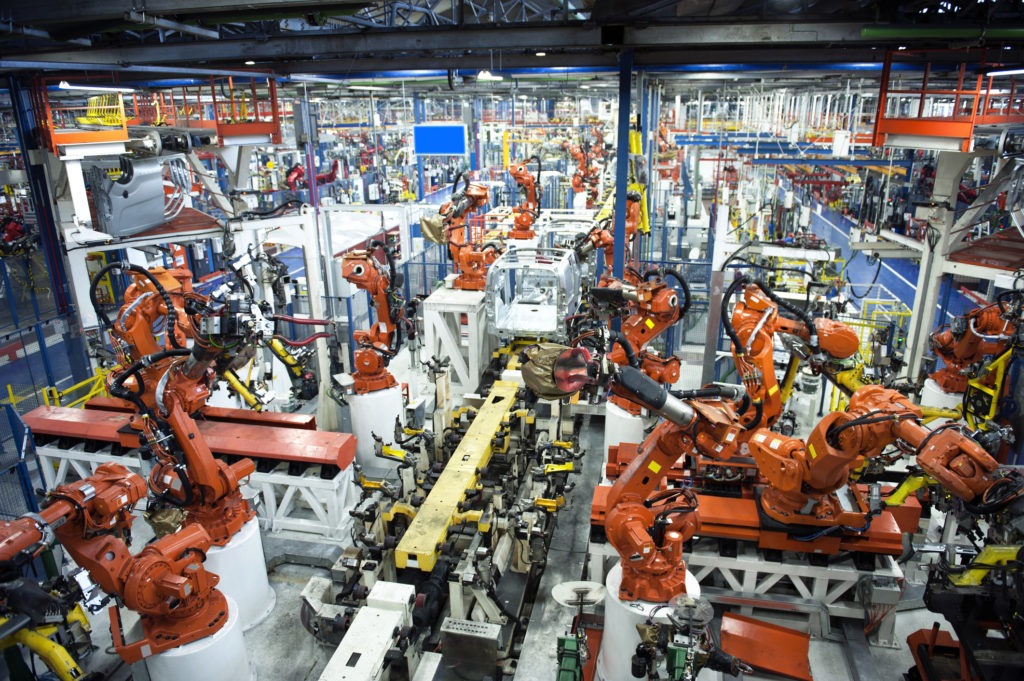France, Germany lead UK in auto automation, Netherlands most ready for industry disruption
18 May 2017

18 May 2017
A 22% surge in the number of robots installed by resurgent French auto manufacturers has helped the country keep apace with Germany, shows a new study, as the UK falls further behind. Nevertheless, the UK remains one of the countries best-placed to survive the approaching auto industry revolution, just behind Germany according to a new report, which ranks the Netherlands as the most prepared among world advanced economies.
France now has the second-highest number of robots working alongside humans in auto production, according to the International Federation of Robotics (IFR), with 1,400 units – corresponding to 940 units per 10,000 workers, compared to around 1,150 per 10,000 workers in Germany.
Annual robot sales to the French auto industry increased by 7% per year between 2010 and 2015, with car manufacturers ordering 6% more per year and suppliers by 9%, boosted by government initiatives to strengthen production.
However, the UK meanwhile languishes in 10th position of countries in the EU – behind many poorer member states – with only around half the number installed now in France. The position risks the UK’s future competitiveness, especially as it begins to leave the bloc.
President of the IFR Joe Gemma said: ′The positive impact of robots on European competitiveness and employment can be seen in Germany. The country´s automotive sector, for instance, holds the top position for robot density in Europe…
′As a result of the ongoing trend to automate production, employment in the German car industry rose by about 93,000 jobs to 813,000 during the period 2010 to 2015.’
In the UK, according to the IFR: ′It is not unfair to assume that the decision to leave the EU will influence investment decisions by foreign car companies on production sites in the UK.’ All Big Three Japanese carmakers (Toyota, Nissan and Honda) produce vehicles in the UK, with three-quarters destined for export, mostly to the EU.
However, the IFR assumes that the UK government will draw up regulations and supporting structures to avoid shipment duties on goods. Regardless, the UK enjoys frequent investment announcements such as capacity expansions and modernisation by both foreign and local players, showing a continued confidence in the advantages of the UK despite Brexit, such as its highly flexible workforce and business-friendly environment.
Additionally, the country retains a top-five position among ten of the world’s most advanced economies to survive the titanic disruption in the industry over the next 10-15 years coming from electrification, autonomy, mobility and connected cars, according to a new report from German consultancy Roland Berger.
The Netherlands takes top position in the study due to being a leader in electric vehicle (EV) charging infrastructure, high public preference for autonomous vehicles, EV sales, ICE regulatory restrictions and a strong type approval process. The country’s only weak areas are in test road availability for autonomous vehicles, automotive association activities, mobility behaviour and preference for EVs.
Germany comes fourth in the list, behind Singapore and China, performing strongly in EV charging infrastructure, customer curiosity for new auto tech, OEM digital sales channels and high mobility service preference. However, its ranking is hit hard in particular by low EV sales, low numbers of shared vehicles, automotive association activity and its type approval process.
Finally the UK makes the top five, closely following that of Germany. It achieves high scores in terms of customer curiosity for new technologies, as well as for its rapidly strengthening EV charging infrastructure. Its OEM digital sales channels also outperform the average of the ten advanced economies studied. However, consumer interest in mobility services remains a key weakness in the UK, with the number of shared vehicles falling below the average, as well as the conjoined consumer preferences for mobility services and consumer mobility behaviour. Consumer preferences for EVs are also below average, leaving the UK in a strong position technologically, but OEMs and partners have a long way to go in converting British consumers to EVs and especially broader mobility services.
Head of Roland Berger’s global automotive competence centre Marcus Berret warns the auto industry to keep ahead of these revolutionary disruptive changes to the industry. He said: ′Complete value chains will disappear, new business models will emerge – incumbent OEMs and suppliers need to face up to the changed competitive landscape.’